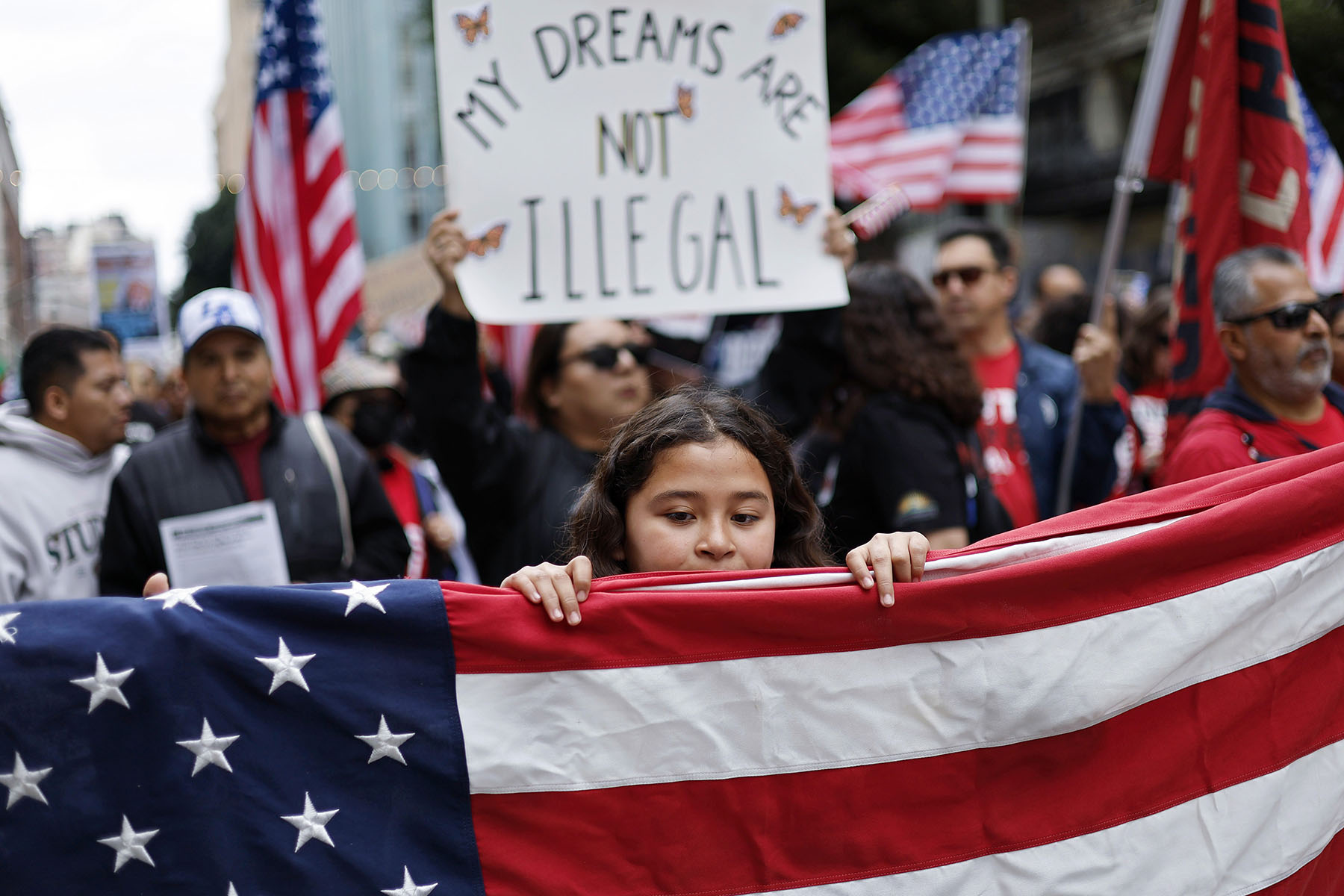Two decades ago, Texas made history as the first state to grant in-state tuition to undocumented students. Now, it has taken that opportunity away — upending thousands of young lives and, advocates warn, potentially influencing other states to restrict higher education access for immigrants.
The U.S. Justice Department filed a complaint against Texas in June seeking to prevent the continued implementation of a 2001 policy that has allowed tens of thousands of undocumented students to pay the same for college as Texans with legal status. Rather than defend the Texas Dream Act in court, the state’s Attorney General, Ken Paxton, agreed to a “consent judgment” with President Donald Trump’s Department of Justice within six hours of the complaint’s filing in U.S. District Court for the Northern District of Texas.
On Tuesday, legal experts, educators and undocumented students warned of the far-reaching consequences of rollbacks to in-state tuition policies in Texas and other states during a call hosted by United We Dream, an immigrant youth-led organization. With the Center for Migration Studies finding that undocumented women are more represented on college campuses than their male counterparts, rescinding in-state tuition is of particular concern to women.
“The repeal of the Texas Dream Act is an attack on students who have grown up here and call Texas home, and it follows other cruel decisions in the state that have jeopardized the safety and rights of children and young people, particularly immigrant youth,” said Juan José Martinez-Guevara, United We Dream’s Texas advocacy manager.
Those “cruel decisions” include the Trump administration’s move in January to lift restrictions on immigration enforcement at sensitive locations such as churches, hospitals and schools. Martinez-Guevara also cited the detention in May of a California fourth-grader who attended an immigration hearing at a Houston courthouse and the suicide of 11-year-old Texan Jocelynn Rojo Carranza in February after her classmates reportedly bullied her about her family’s immigration status.
“Students of all ages in Texas are being robbed of their freedom to learn and the right to receive a safe and peaceful childhood because of their immigration status,” Martinez-Guevara said. “Just as Texas was the first state to pass a Dream Act in 2001, later inspiring 23 other states and the District of Columbia to pass similar laws, this wrongful and undemocratic repeal of the law is now being pushed as a blueprint to undemocratically end in-state tuition, militarize college campuses and persecute students in other states.”
Those states include Kentucky and Minnesota, which have been targeted by the Justice Department about their in-state tuition policies for undocumented students. But Texas, Martinez-Guevara added, stands out as a state officials have allowed to become a testing ground for some of the most extreme proposals in Project 2025, the Heritage Foundation’s ultra-right blueprint for a second Trump term.
On June 24, the ACLU of Texas, Texas Civil Rights Project, Democracy Forward, National Immigration Law Center and Dallas-based law firm Lynn Pinker Hurst and Schwegmann filed a motion to prevent the Texas Dream Act from ending because the policy was repealed suddenly and without input from students, community members and colleges.
“If Texas Attorney General Ken Paxton will not fight for the policy, then we will,” said Valeria Alvarado, a member of the ACLU of Texas’ legal team.
Alvarado said that many Texans are deeply uncertain about what the law’s repeal means for them. Some students have already been billed for fall semester tuition, for example. Even Texans with legal status wonder if tuition costs will rise as a result of the act ending since the repeal will likely lead to enrollment declines and financial losses for colleges. While Alvarado estimates that Dream Act recipients represent 1.5 percent of Texas college students, their impact is outsized. These students contribute $5.4 billion annually in state and local taxes, according to United We Dream, funding the very schools they may be shut out of attending now.
“These students add significantly to the overall tax revenue of the state and to the funding that these institutions rely on,” Alvarado said.
Rosie Kurtz, a high school math teacher for the Dallas Independent School District, said that she spends a lot of time helping 12th graders, many of whom are immigrants, explore their options for college. Due to the Dream Act repeal, those options will now be limited.
“Part of my job is to motivate them to go out and do something with their life, tell them that they can achieve their dreams,” she said. “How do you motivate students to go on and do their math classes if they don’t think that they can afford to take a math class in college?”
Kurtz said that her community has made longtime investments in these students to help them prepare them for adulthood and college. “And the idea that that could all be snatched away from them in such a cruel fashion is demotivating to the whole educators’ mindset,” she said, adding that denying undocumented students of a higher education will hurt Texas by making its workforce less skilled.
The fact that the Texas Dream Act was in effect for over two decades indicates how much Texans supported the policy, said Ovidia Molina, the middle school teacher serving as president of the Texas State Teachers Association, an affiliate of the National Education Association (NEA), the country’s largest labor union with three million members.
“Educators and community members, families, businesspeople — they all wanted this,” Molina said. “They knew that it was good for Texas.” The Texas Dream Act was signed into law by Republican Gov. Rick Perry, with bipartisan support.
Gladys Fátima Márquez, a member of NEA’s executive committee, said the effort to roll back in-state tuition is part of a broader coordinated attack to undermine public education as a common good.
“We know exactly why public education lies at the core of their attacks, whether in state capitals or in Washington, D.C., because a public, free, universal education that is grounded in teaching critical thinking is a threat to authoritarianism,” she said. “That’s why they want to dismantle, defund, privatize and voucherize public education. That’s why they want to demoralize the educational professionals who have dedicated their lives to teaching, feeding, nurturing, counseling and driving our students to and from school every day.”
Two undocumented students also weighed in on how the repeal of the Texas Dream Act has affected them. They did not provide their names due to their legal status. One student, who said she has lived in the United States since she was nine months old, is a psychology major at a Texas college. Being undocumented made her fear that a higher education would be out of reach, but the Texas Dream Act enabled her to attend a community college. Even with in-state tuition, however, the cost of enrolling in a four-year university was prohibitive for her. A scholarship from TheDream.US, which provides financial assistance for undocumented college students, helped her cover the cost of tuition at the university she enrolled in during fall 2023.
“For the first time, I felt unstoppable,” she recalled. “I made new friends, joined student organizations and was inducted into an honor society last semester, and now, as a senior, with just one semester left, I could finally see the finish line. All that hope vanished the night I found out that the Texas Dream Act was being repealed after 24 years.”
A second student, a recipient of the Deferred Action for Childhood Arrivals Program — an Obama-era policy that gives young people brought to the country as children temporary permission to live in the United States — graduated from a Texas university last year with a microbiology degree.
“My dream has been to go back to school and obtain my Ph.D. to study viral diseases,” he said, adding that the Dream Act’s repeal has made that possibility uncertain. “For me, the repeal of the Texas Dream Act adds to a growing list of obstacles that immigrant youth, undocumented young people like myself, are faced with — whether it’s the looming threat of losing my work authorization in Texas after the Fifth Circuit Court of Appeals ruled to sever work permits for DACA recipients in the state or having to constantly look over my shoulder when taking a walk outside because of the growing risk of being abducted and deported, as is the case for many DACA recipients.”
Krystal Gómez, managing attorney at the Texas Immigration Law Council, said that federal and state officials have sent a clear message: There is no safe space in this country for immigrant youth. Repealing the Texas Dream Act is also dangerous, she continued, because it requires higher education personnel with no understanding of immigration policy to make critical decisions about the future of immigrant students.
“Texas has provided virtually no guidance to universities, just two brief memos from the state higher education board, and that’s it. No definitions, no trainings,” she said.
Last week, her organization held an emergency webinar in which higher education officials confessed to being confused about the repeal, she said.
“We’ve heard from DACA holders at some Texas colleges who are being charged out-of-state tuition, even though those individuals with DACA are lawfully present under federal law, and therefore the court order does not impact their ability to access in-state tuition,” she said. “Some institutions are even saying that they were not going to let undocumented students or DACA-holding students register for classes, which goes far beyond what the court order requires.”
Also concerning is that some universities have given students just 48 hours to upload sensitive immigration documents to their cloud systems, Gomez added. Inconsistent approaches to the Dream Act’s repeal mean that students’ access to affordable education now depends on which campus they’re attending and how that school’s administrators interpret complex federal concepts when it should be determined by their legal status or lawful presence in the country.
“This isn’t implementation,” Gomez said. “It’s chaos.”
The Texas Immigration Law Council is tracking inconsistent university policies and misclassifications of students and publishing explainers and information for young people, Gomez said. It is also pushing state agencies to issue guidance and for institutions not to buckle to fear as they try to comply with the law.
“Texas may be the testing ground for attacks on educational access nationwide, but we intend to make it the place where this assault on opportunity hits a wall,” Gomez said. “The question before us isn’t just about tuition rates. It’s about whether we’re going to allow fear and confusion to replace clear law and basic fairness.”







